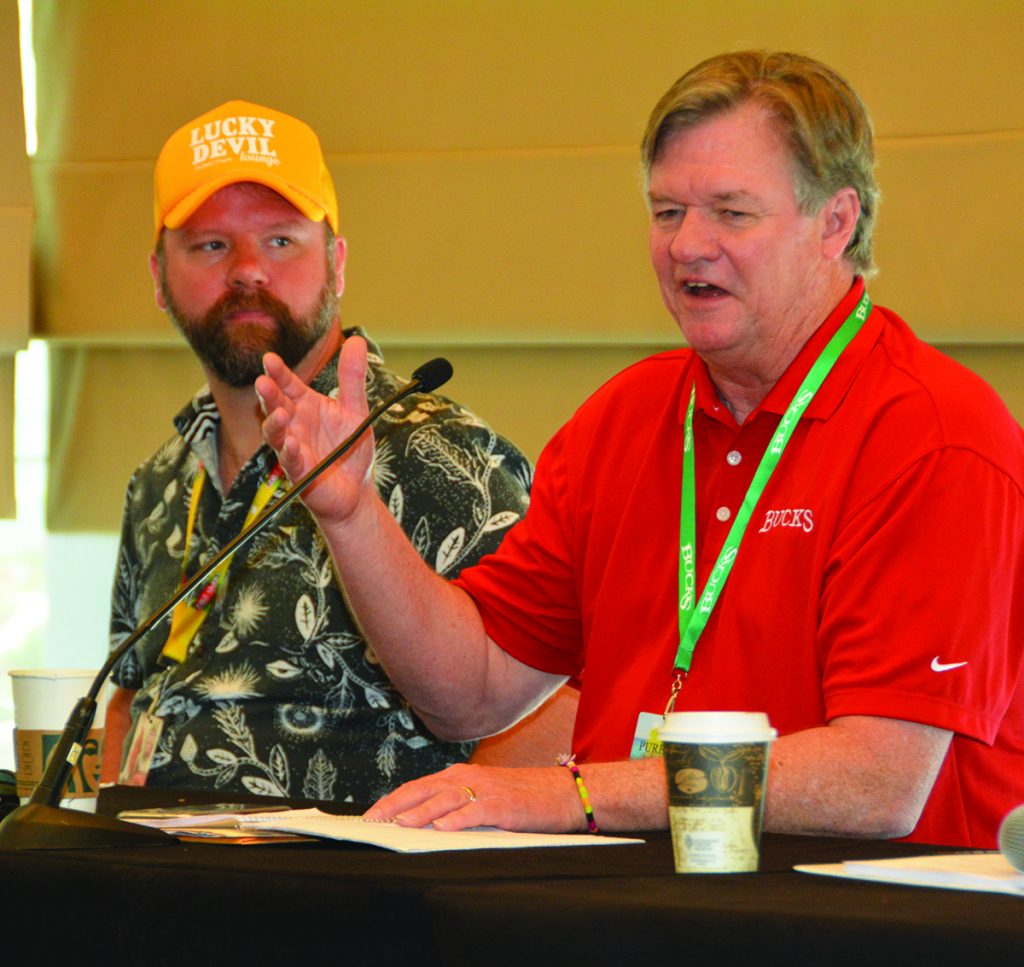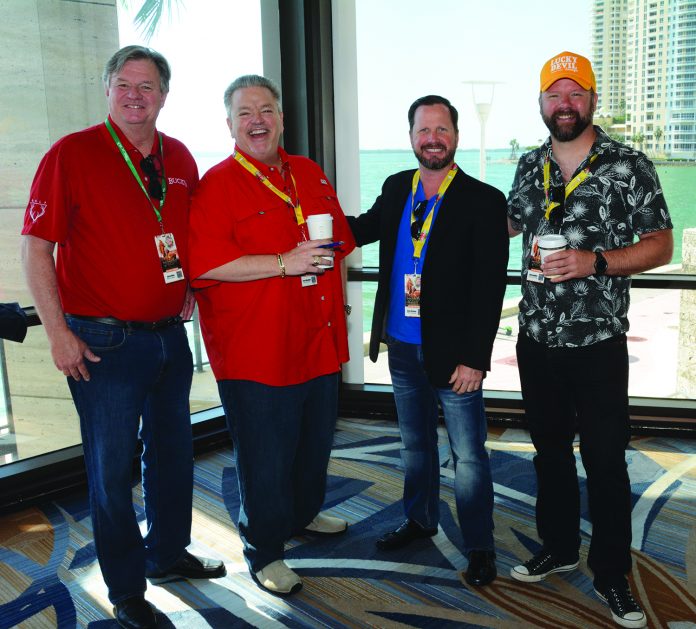(Note: This story appears in the July 2021 issue of ED Magazine)
Four industry voices — Jason Mohney, Jerry Westlund, Curtis Wise and Shon Boulden — each experiencing success despite COVID, talk about how they stayed afloat and how to potentially safeguard against future industry-wide challenges.
COVID-19 created tremendous challenges for adult nightclub operators, large and small, in keeping their clubs and people going. The EXPO 2021 Comeback Panel brought together three top club-chain operators and an innovative small-club operator to explore how each kept their businesses and teams alive by thinking very differently, what lessons they learned in the process, and their thoughts on the future of the industry.
Déjà Vu and ACE National President Jason Mohney noted the biggest COVID-19 challenge for his clubs has been maintaining contact with their people. Déjà Vu hosted weekly meetings and seminars and routinely called their people, some of whom were hospitalized with COVID.
In the beginning, Mohney explained, nobody expected a 14-month shutdown; instead, believing it would be a matter of weeks, but unfortunately, it went on and on. During the shutdown, Déjà Vu tried several ideas they ultimately realized wouldn’t fly—among these, setting up tents in their parking lots. But, unfortunately, new rules in many places severely limited tent capacity, quickly quashing the feasibility.
“We kept rolling with the punches as they added new rules,” explained Mohney.
“If you’re not out there shaking hands, you’ll get punished by these situations. If you don’t have your mayor or another city official’s phone number, you’re going to lose.” — Jason Mohney
Mohney let their Michigan managers decide whether to chance going to jail for opening in defiance of COVID- guidelines. The managers unanimously agreed to risk jail to “bring nudity to the people.” As a result, one of their clubs received a 36-hour shutdown for the horrendous crime of being topless in a topless club while restaurants and bars could open.
Club operators worked together under the ACE National umbrella to create COVID plans and business models and look to the future. They learned that a pandemic would recur, and they must be prepared.
“Have a pandemic plan. Keep up your guard on cleaning, sanitizing, and keeping PPE stocked and keep your staff safe,” explained Mohney. “If your people are sick, let them stay home.
“You need to get involved with your communities,” Mohney added. “If you’re not out there shaking hands, you’ll get punished by these situations. If you don’t have your mayor or another city official’s phone number, you’re going to lose.”
Mohney also cautioned clubs to be prepared against cyberattacks, have insurance covering them, and get all of their people vaccinated.
Curtis Wise is the founder and principal of the Buck’s Cabaret club chain, which started in Texas and expanded into Philadelphia, South Carolina, and Ohio. Wise recalled attending the Dallas Maverick’s game on March 11, when they canceled the season.
“I watched everybody getting texts of the news. Then, I looked down and saw team owner Mark Cuban, showing it to somebody,” explained Wise. “That’s when it all started, over just a few days.”
The prolonged shutdown took Wise, like everyone else, by surprise. “About three weeks in, after doing cleaning and updates, I thought, what will we do now,” explained Wise. Wise began reading the entirety of the New York Times daily with countless COVID-related stories to occupy the idle time. About a month in, with employees unable to collect unemployment or even reach social agencies, Buck’s started feeding employees. Around that time, Wise stopped reading the Times.
“I could no longer absorb the negativity of every sad story,” Wise said. “It’s tragic, but I had to figure out how we’ll survive and reopen. Most importantly, how will our entertainers and staff make a living?”
Fortunately, Texas started opening up sooner than other states. But Wise realized, to reopen successfully, his people needed to keep track of all the varying, frequently changing city, county, state, and federal agency’s COVID-operational mandates, so he created a COVID book with Buck’s required operational protocols and guidelines.
“Despite no current mandate, we still take temperatures of every customer, employee, and vendor coming in the door,” said Wise. “As a result, we increase our odds against having illnesses.
“It’s important to keep records and document everything you’re doing to comply,” he continued. “We had haters filing complaints against us for non-compliance. We needed to prove them groundless. We had multiple inspections from multiple complaints. We got one ticket for $1,000 from a Code Compliance agent who was certain we didn’t have the right to be open.
“I was almost afraid to wake up in the morning and see if anything happened at the clubs or what new rules might have been imposed,” explained Wise. It was a tough time; we just kept fighting through it. We couldn’t just crawl in a hole and wait for someone to bring us food and water. Other clubs across the country have been closed for as much as 14 months; it was just crazy.
“The key is, just keep thinking about your future,” explained Wise. “Keep that playbook; we’re all entrepreneurs. An entrepreneur must be innovative and figure out how to get there. Use the playbook to try to keep up with which governmental entity’s doing what when. You must figure out how your business will operate, what you can do.”
“I was almost afraid to wake up in the morning and see if anything happened at the clubs or what new rules might have been imposed. (But) we couldn’t just crawl in a hole and wait for someone to bring us food and water.” — Curtis Wise
Unlike the other Comeback panelists, Shon Boulden owns just two small clubs; Devil’s Point and Lucky Devil Lounge, in Portland, Oregon, which feature about six entertainers nightly. Boulden brainstormed ways to pivot through the shutdown and thought of dancers delivering food to doorstep—and that’s how “Boober Eats” was born. His staff was all in for the idea. The security guarded the dancer/deliverers; the cooks cooked; the bartenders answered phones. Local media exposure snowballed into a RollingStone.com article, then things went crazy, with lots of phone interviews and increased business.
Then one day, Boulden got a cease-and-desist from Uber Eats to stop using their trademarked name.
“I thought, it’s cool, we got our 15 seconds,” explained Boulden. Boulden changed the name of the delivery service to Lucky Devil Eats and was rolling again. Soon after, a shutdown local events company with a tent, lights, and sound offered to partner on a drive-through strip club. Once again, Boulden’s staff was in. Rolling Stone wrote another article; then, things got even crazier than before with a deluge of media mentions, including Stephen Colbert, Bill Maher, and The Daily Show. Boulden took the opportunity to remodel the bar. Lucky Devil operated the deliveries and the drive-in from March 17 to June 6, when Oregon’s governor allowed reopening at 25% capacity.

“It was an amazing experience,” noted Boulden. “For me, being in the news and everything else. We didn’t make much money; sometimes, we lost money. But my staff and I were motivated. We kept our staff employed and kept that positive mental attitude. I couldn’t imagine just staying home playing PlayStation for three months.”
By keeping his people working during the shutdown, Boulden had the advantage over other clubs facing challenges in rehiring staff to reopen, a substantial current obstacle nationwide for businesses of all sorts trying to reopen.
Pony Club chain owner and recent ED Hall of Fame inductee Jerry Westlund, with clubs in several southern and Midwest states and California, noted that his eastern clubs are still dealing with percentage restrictions. At the same time, his Long Beach, California Fantasy Castle has been closed since March 2020. He was crossing his fingers for a late-June reopening.
“It’s scary cause I don’t know what the triggering mechanism’s going to be for 100% capacity,” noted Westlund.
Some of Westlund’s clubs were required to become restaurants during COVID to reopen. “We gave customers plates with slices of pizza,” explained Westlund. “We said, we don’t care if you eat it or use it as an ashtray, just keep it in front of you.
“I think our biggest problem with the COVID response was the decentralized decision-making,” noted Westlund. You suddenly had health department officials given police powers. How the hell did that happen? The people who had given us 89’s or 91’s on our health inspections now had life-and-death decision-making powers.”
Westlund predicted nothing would change with governmental response to a future pandemic.
“I can only hope, but my guess is, when something like COVID happens in the future, I don’t think we’ve learned anything; it will be the same shit show it was this time. Unfortunately, decisions regarding our industry are driven by the lowest common denominator. The worst club sets the rules for all of us; that’s the problem. You all have competitors. They’ll push the envelope, and we’ll play by their rules. So give them a call. Reach out and explain that we’re trying to stay together on this cause that’s how they get us. They pick us off, one by one.”
Larry Kaplan has for 21 years been the Legal Correspondent for ED Magazine. Mr. Kaplan is a broker in the sale and purchase of adult nightclubs and adult retail stores and the founder and Executive Director of the ACE of Michigan adult nightclub state trade association.





























